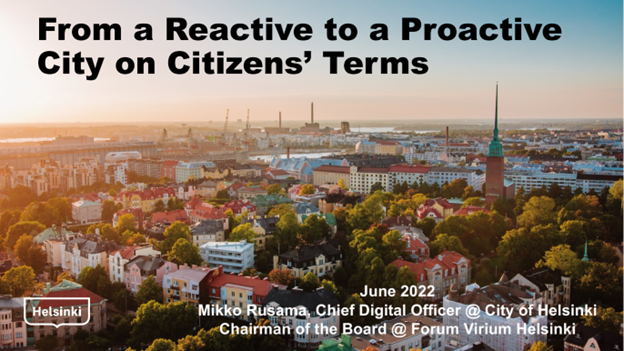
During the Third Progress Meeting of UserCentriCities on 08 June in Espoo, Mikko Rusama, chief digital officer from Helsinki, gave a keynote presentation on proactive service delivery.
Helsinki municipality has been long working to put digitalisation of public services at the centre of its agenda, and using it as a strategic enabler for all the city’s operations, focusing on four key elements:
- productivity and costs savings: produce more and better with fewer resources;
- using e-services as the primary option: services are easily accessible to citizens 24/7;
- proactive and preventive service recommendations;
- automate services and processes and develop new self-service options.
To realise this vision, two interrelated paradigm shifts must occur in the local administration: going from a reactive to a proactive service delivery and moving from outright exploitation to human-centric use of data. The first paradigm change refers to the need to flip the service model by anticipating citizens’ needs, triggering personalised services. An example of this approach is Helsinki’s own pre-primary education allocation service, which received the first-ever UserCentriCities Award.
Another example is using health care data to identify and proactively treat high-risk patients. Analysing data from 640,000 patients using 300 approved criteria has allowed Helsinki’s health care system to identify gaps and prioritise patients by inviting those with higher risks to schedule a doctor’s appointment to receive proper care. Furthermore, this proactive approach has also proven beneficial during the pandemic, as data-driven analysis through the “Corona dashboard” has allowed the health care system to predict the needs of hospital resources according to the population’s rate of exposure, infection and recovery, as well as to proactively reach out to risk groups for COVID-19 vaccinations via individual SMS.
On the other hand, the second paradigm shift, from outright exploitation to human-centric use of data, seeks to empower individuals with their personal data, as described in the MyData Declaration. Even though very strict regulations on using personal data already exist, such as Europe’s GDPR, there is still mistrust from citizens on the way governments use their data and on how AI and machine learning algorithms are employed. How can we ensure that the use of personal data by local governments is beneficial to citizens? Accountability, transparency and healthy-trust relationships are key to safeguarding citizens’ rights and safety, especially when it comes to digital public services delivery. Moreover, the question of how do we grant permission for data processing also needs to be considered. Is checking the consent box in a form enough? Most people do not know the implications of what they are consenting to, or even if they have the right to deny or revoke consent regarding their own data usage. The legal basis for data processing is an issue to be solved and that must be as transparent as possible for people to understand how, when and where their data is being used.
What are the lessons learned from Helsinki's experience as we move forward with these paradigm shifts? First and foremost, we must challenge our old ways of working and create a new culture through user-centricity and experimentation. To flip the service model and provide an automatic service there are certain criteria a city should take into account:
- the city has all the required personal data and information regarding the citizen’s likely service needs; and
- the city has permission to use the data;
- the city must provide a statutory service;
- a citizen is eligible for the service;
- proactive service delivery provided benefits both for the citizens and the administration.
Another lesson learned is that first, we must fix the "digital plumbing", i.e. the digital foundations such as infrastructure, shared systems, data and AI capabilities , which have to work flawlessly to be able to deliver proactive services.
As there are lessons learned and benefits, there are also challenges to overcome. Cities are built and conceived as humongous data silos, with many different registries and systems storing personal and sensitive information. Most administrations are unable to share or combine data between them or to perform automated decision-making due to legal restrictions. There is also a challenge in regards to data interoperability due to the lack of APIs or harmonised data formats, as well as the lack of digital consent management. There is a fundamental ethical approach that needs to be considered. Helsinki is already a step ahead with its AI Register and is moving forward to realising its vision and become one of the most functional city making the best of digitalisation for its citizens.
To learn more about Mikko Rusama's keynote and Helsinki's strategy, please download the presentation here.